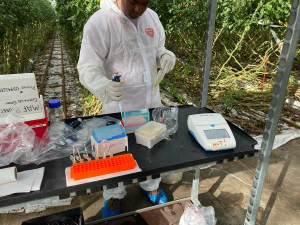NZ Catchment Groups Thrive with ‘Source to Sea’ Approach
The most successful catchment groups in NZ are those that have 'a source to sea' approach.
 Ministry for Primary Industries Senior Scientist, Dr Subha Das, checks samples in a Kenyan field as part of a research project to develop a rapid test for detecting disease in crops.
Ministry for Primary Industries Senior Scientist, Dr Subha Das, checks samples in a Kenyan field as part of a research project to develop a rapid test for detecting disease in crops.
Scientists from the Ministry for Primary Industries (MPI) are part of an international team working to develop a low-cost diagnostic tool that could significantly improve food crop production in developing countries.
The rapid test uses a combination of chemistries to identify plant disease and will allow growers to remove unhealthy plants in the field early in their growing season, enabling them to increase crop production of important food sources such as maize.
MPI’s Plant Health and Environment Laboratory (PHEL) scientists are working with researchers at Northwestern University (NU) in Illinois, to build the PlantdX2.0 tool, which has shown positive results in field trials in New Zealand and Kenya.
The ultimate aim of the project is to produce a test line read out system, like Covid RAT tests, that farmers can use in the field to test their crops for specific diseases.
Jeremy Thompson, PHEL team manager virology and phytoplasmology, says that early prototypes of the test were trialled in New Zealand for detecting virus infection in symptomless tomato plants.
“More recently the tests have been trialled on food crops in Kenya’s Maseno area where beans, sweet potato and maize are some of the main staple crops,” Thompson says.
“Much higher yields can be achieved if growers can identify and remove diseased plants from the field early,” he adds.
The project is funded by a $1 million USD grant from the Bill and Melinda Gates Foundation, which supports projects to advance developing countries, and led by Julius Lucks, Professor of Chemical and Biological Engineering at NU.
Mid-way through the two-year trial, the goal is to produce a tool that is cheap to make and easy for farmers to use.
Thompson says the test could also be used by farmers in New Zealand and other developed countries to improve crop production.
“The project is looking to make the technology available to New Zealand farmers and growers to test for specific viruses or diseases in crops.
“While the focus of this research is to develop a reliable diagnostic tool for plants, the test could also in future be applied to animal and human health.”
The Meat Industry Association of New Zealand (MIA) today announced that Chief Executive Officer Sirma Karapeeva has resigned from the role.
The winners of the 2026 Hawke’s Bay/Wairarapa Dairy Industry Awards were announced at the annual awards dinner held at Copthorne Solway Park in Masterton on Thursday evening.
Environment Southland is welcoming this week’s decision by the Environmental Protection Authority (EPA) to approve the release of Blaptea elguetai, a leaf‑feeding beetle that will help control the highly invasive Chilean flame creeper.
This March, the potato industry is proudly celebrating International Women’s Day on 8 March alongside the International Year of the Woman Farmer, recognising the vital role women play across every part of the sector — from paddocks and packhouses to research, leadership, and innovation.
Fruit trader Seeka posted a record profit and returns to shareholders in 2025.
Recent weather events in the Bay of Plenty, Gisborne/Tairawhiti, and Canterbury have been declared a medium-scale adverse event.

OPINION: A mate of yours truly reckons rural Manawatu families are the latest to suffer under what he calls the…
OPINION: If old Winston Peters thinks building trade relations with new nations, such as India, isn't a necessary investment in…